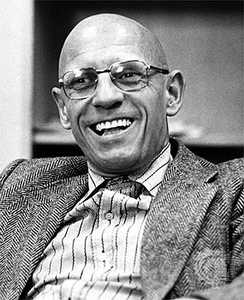“Everything in the world is about sex except sex. Sex is about power.” -Oscar Wilde
Any obscenity law that has ever existed is a product of a dominant power structure exerting control over a body of people. In many cases, it is both desire and sexual representation among the masses that are controlled. The final aim of laws of censorship is to remove the knowledge of sexual pleasure from the masses completely and, if that is not possible to remove this knowledge entirely, then perhaps this knowledge will be associated with guilt and shame (for example, expressing sexuality is viewed as shameful in most structured religions around the world). This is also enforced through threat of punishment.
Michel Foucault has written some thought-provoking books and essays with respect to the act of writing, power structures in society and sexuality. Foucault’s work The History of Sexuality so masterfully elucidates what is common knowledge in the world today: sex and sexuality are controlled by external sources of power. Foucault’s work transcends barriers of time, culture and language and postulates the universality of structures of power involved in sexuality.
“Thou shalt not go near, thou shalt not touch, thou shalt not consume, thou shalt not experience pleasure…To deal with sex, power employs nothing more than a law of prohibition.” (Foucault 84)
Michel Foucault published his three-volume study The History of Sexuality was published between 1976 and 1984, in his study The History of Sexuality, wrote specifically about the relationship between a higher power, like the government of a particular country, and the dominated being and body. In the chapter “Objective”, Foucault rightly states: “In the space of a few centuries, a certain inclination has led us to direct the question of what we are, to sex.” (Foucault 78)
Foucault laments the fact that the West has constructed sex as a rational object and has therefore been successful in constructing barriers for the common folk. However, the common folk is inexplicably linked to his/her body, history and individuality, from which one cannot displace one’s sexuality. He criticises the fact that, even though sex and sexuality is so important to our identity and our history, it is still considered a secret, banishing it to an illogical silence.
However, this compulsion for common folk to understand their sexuality through self-discovery is reflected in the artistic works of authors, artists, musicians, sculptors etc. since time immemorial. Foucault calls the knowledge that one may glean from an understanding of their identity and history (through their sexuality) a knowledge-pleasure. He writes:
“For many years… under the spell of an immense curiosity about sex, bent on questioning it, with an insatiable desire to hear it speak and be spoken about, quick to invent all sorts of magical rings that might force it to abandon its discretion. As if it were essential for us to be able to draw from that little piece of ourselves not only pleasure but knowledge… a knowledge of pleasure, a pleasu’re that comes of knowing pleasure, a knowledge-pleasure…” (Foucault 77)

If this knowledge of pleasure is indeed important, why have the general masses been suppressed from discovering their sexuality? Why is this act considered unnecessary and why is talk about it considered taboo? “What is this force that so long reduced it to silence and has only recently relaxed its hold somewhat, allowing us to question it perhaps, but always in the context of and through its repression?” Foucault asks.
An expression of sexuality is the last frontier in understanding one’s self. Indeed, confusion in sexuality, or the ignorance of the same is enough to cause any member of society much distress. By forbidding this knowledge of the self, it would seem that these societies are governed by repressive state apparatuses that wish to keep these members of societies in the dark.
Foucault also comments on Freudian psychoanalysis, theories that were first published by Freud in the 20th century. Foucault presses the point that psychoanalysts have also discussed the importance of discovering one’s sexuality. Psychoanalysts also do not approve of repressive external power structures that throttle any sense of individuality expressed in the form of “rebellious energy”. Psychoanalysts believe this silencing is “inadequate for deciphering the manner in which power and desire are joined to one another” as psychoanalysis believe power and desire “to be linked in a more complex and primary way.”
Foucault’s History of Sexuality is truly an all-encompassing study about the nature of the human spirit, with respect to the necessity to understand one’s identity through a discovery of one’s sexuality. As a parting note, Foucault writes the following: “Renounce yourself or suffer the penalty of being suppressed; do not appear if you do not want to disappear… Power constrains sex only through a taboo that plays on the alternative…between two non-existences.” (Foucault 84)
Sources:
Foucault, Michel. The History of Sexuality. New York: Pantheon, 1978. Print.
Header image: Thierry Ehrmann, Wikimedia
